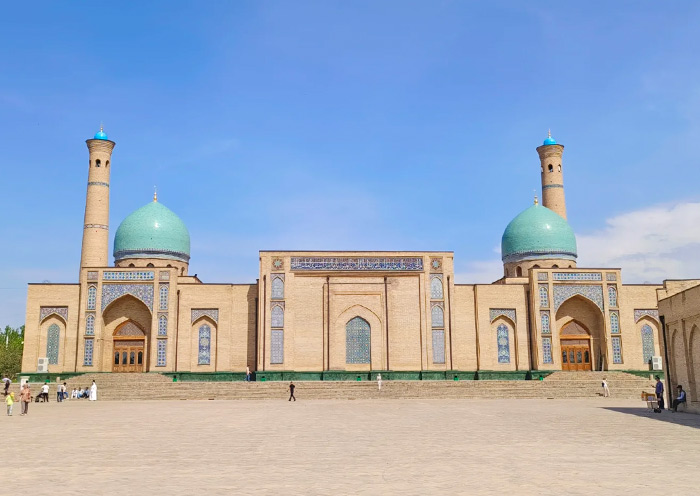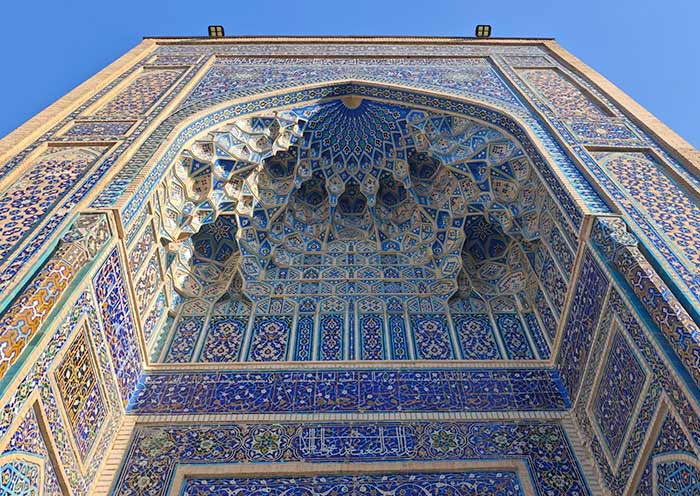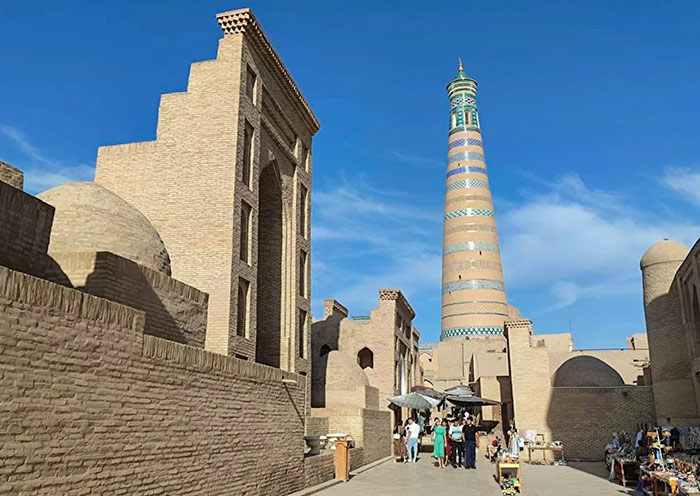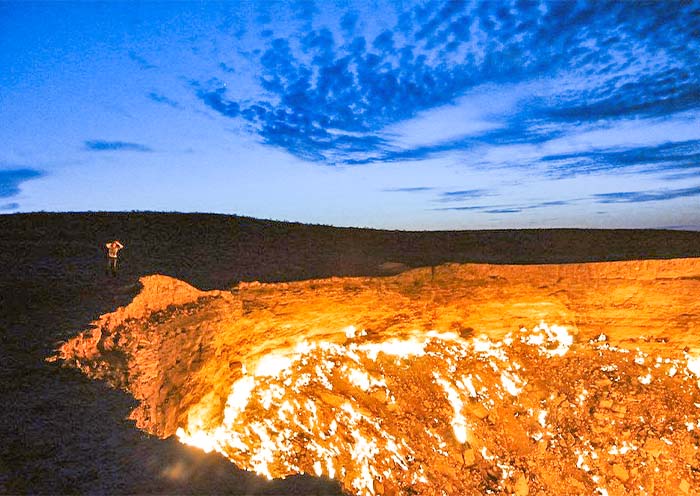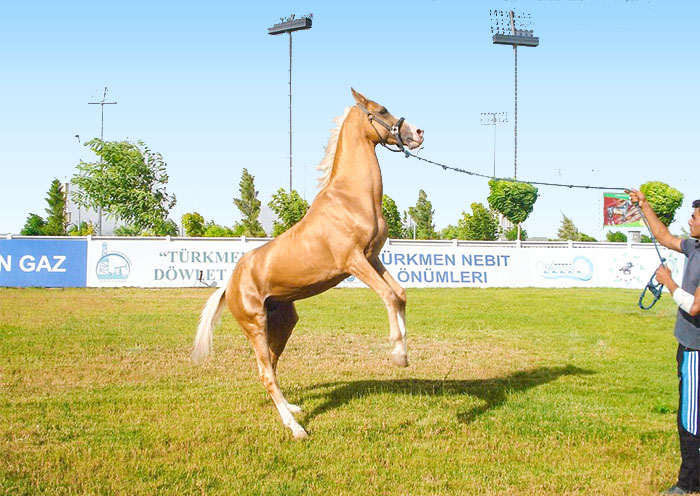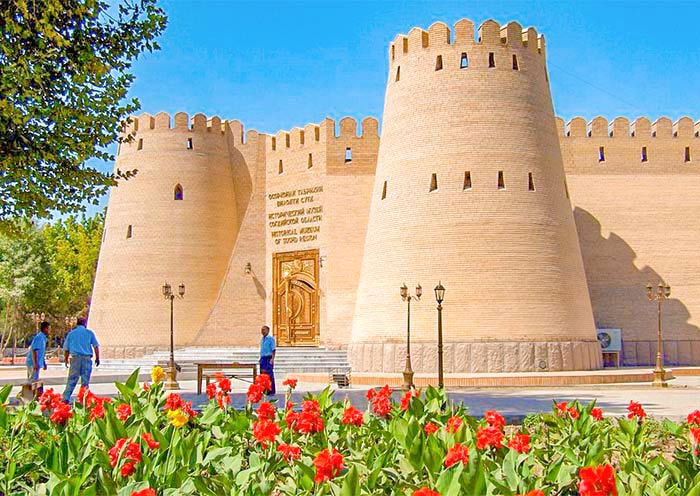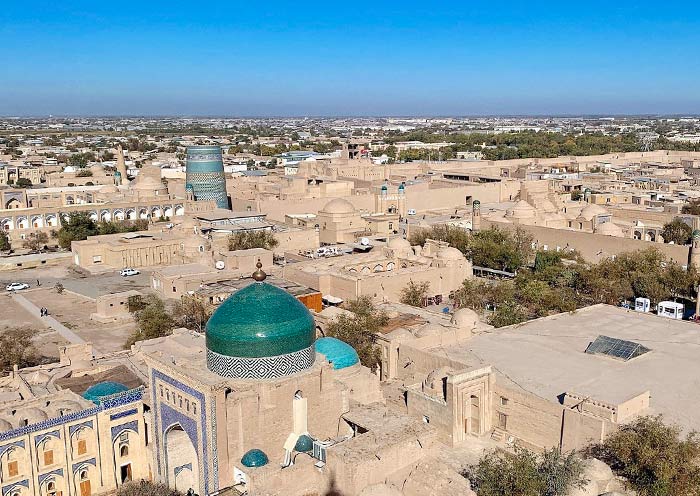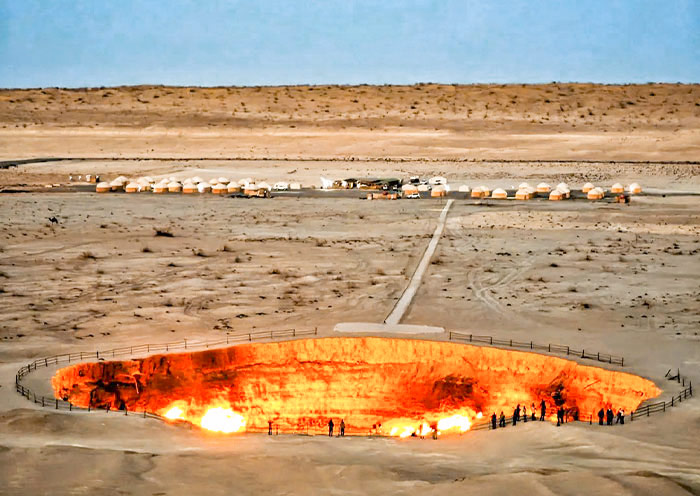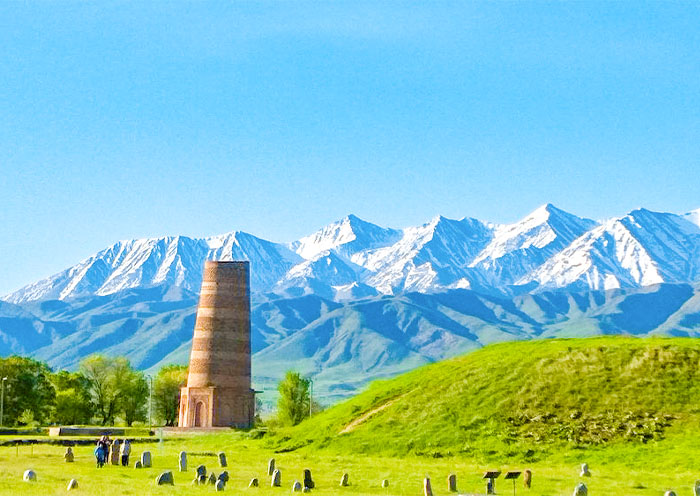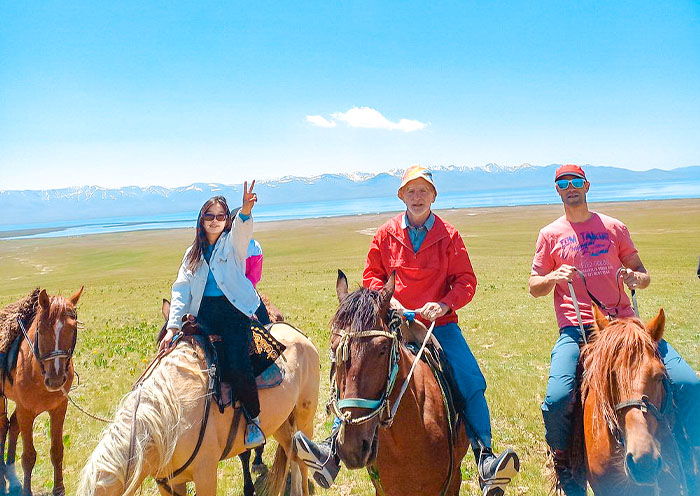12 Days Uzbekistan Turkmenistan Tour: Tracing History, Chasing Adventure
- Highlights
- Itinerary
- Price
- Trip Notes
- Accommodation
- Photos
- Reviews
Uzbekistan & Turkmenistan: Silk Road Trio + Turkmen Marvels + Twin Capitals
If you are history buff, architecture enthusiast, or adventure seeker, join us on our 12-Day Uzbekistan & Turkmenistan Tour - the ultimate two-stan tour combining Silk Road culture, desert adventure, and two fascinating capitals.
Start and end in Tashkent, Uzbekistan’s dynamic capital, tracing an arc of “civilization - adventure - civilization.”
Opening (Civilization): From Tashkent’s blend of Soviet-era heritage and modern flair, step into Khiva’s intimate walled city, where intact ramparts, madrasas, and minarets evoke the Khanate era and the caravan days of the Silk Road.
Middle (Adventure): Cross into Turkmenistan. Experience the otherworldly Darvaza Gas Crater - “the Door of Hell” - under the night sky, then the surreal white-marble cityscape of Ashgabat. Exolore the ancient ruins of Kunya-Urgench and Merv.
Finale (Civilization): Cross border to Bukhara, famed for its trade domes, mosques, and the Kalyan minaret skyline, then conclude in Samarkand’s grand monuments - Registan, Shah-i-Zinda, and Gur-e Amir - masterpieces of the Timurid age.
With Asia Odyssey Travel, we take care of all arrangements - sightseeing, accommodation, transport, visas, and border crossings - just come and enjoy.
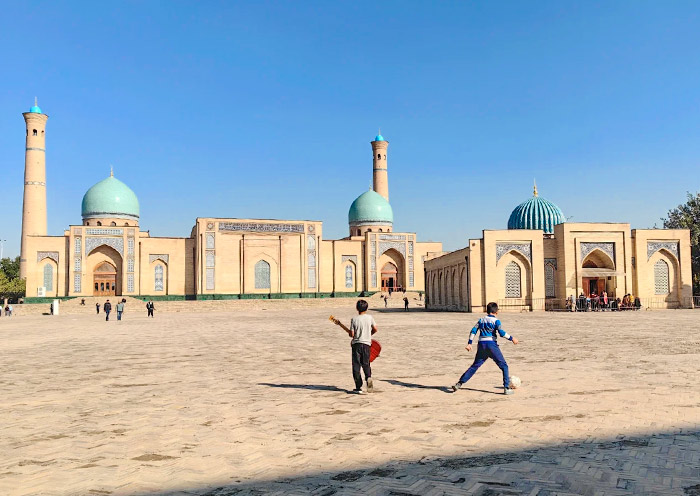
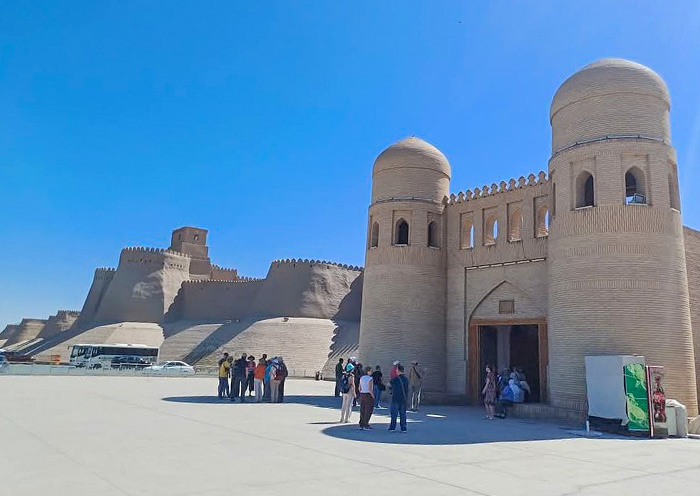
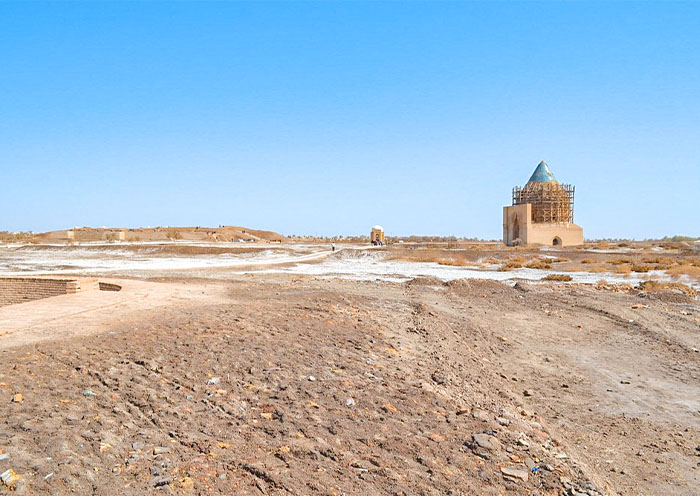
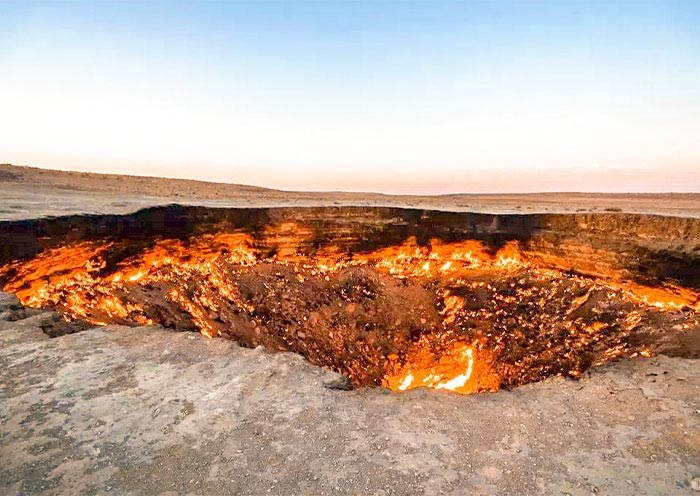
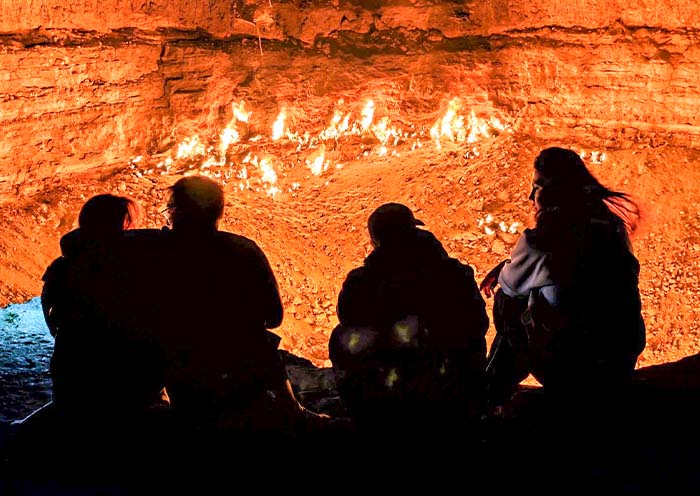
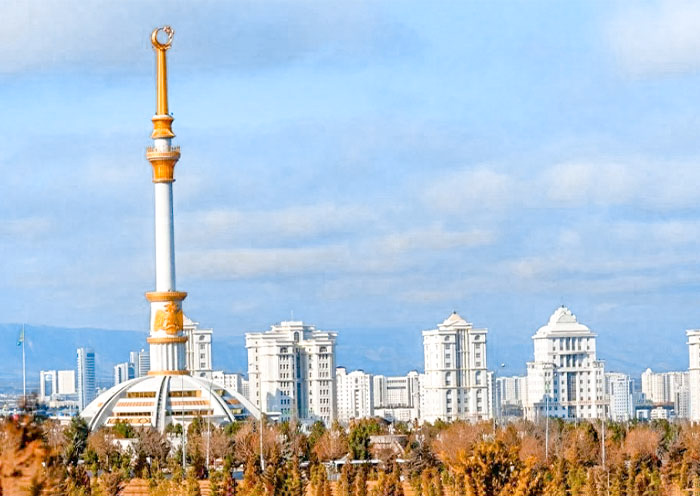
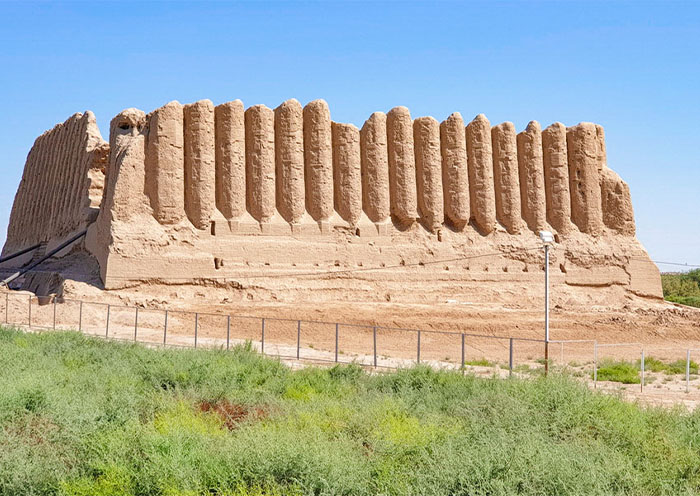
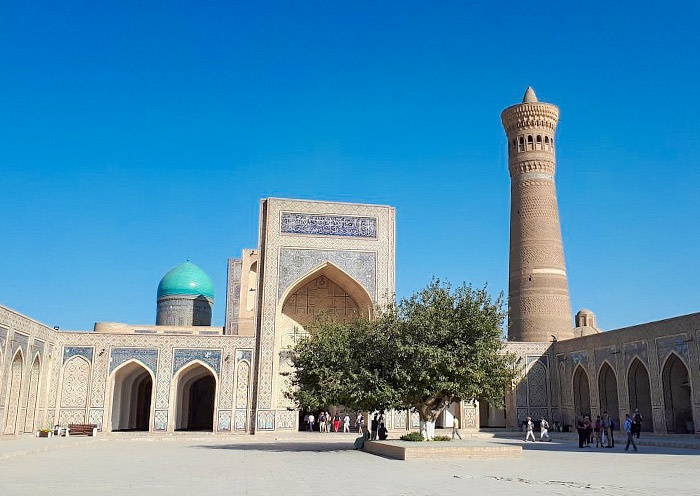
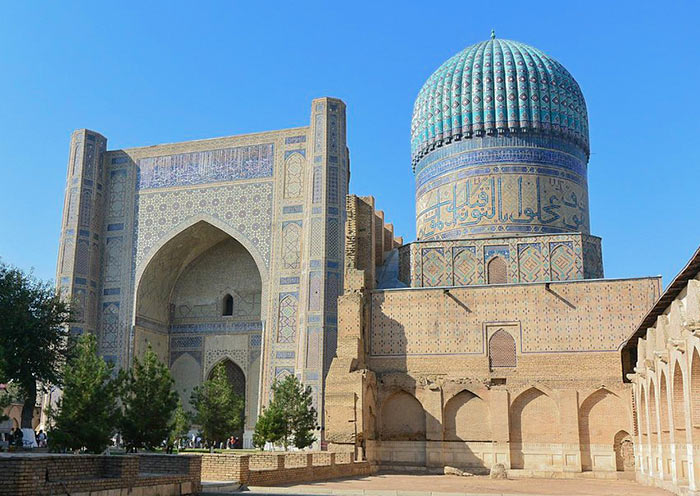
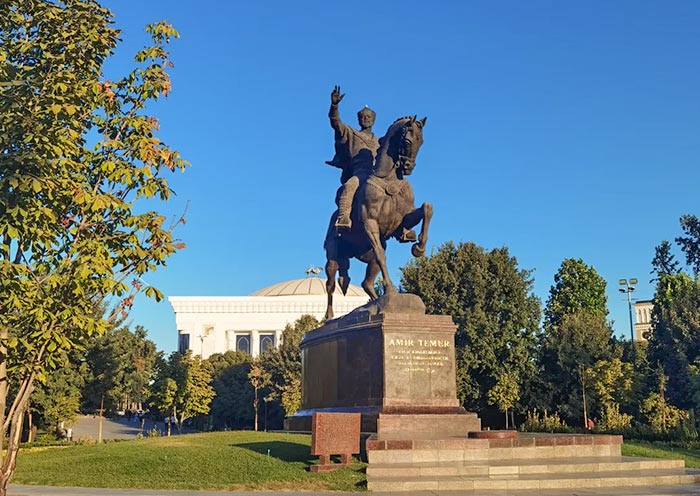
Itinerary at a Glance
Tashkent, Uzbekistan (2 Days)
Khast-Imam Complex (Hazrati Imam Complex), Chorsu Bazaar, State Museum of Applied Arts, Tashkent Metro (Soviet-era), Amir Timur Square
Khiva, Uzbekistan (1 Day)
Fly to Khiva; Ichan-kala (Kalta Minor Minaret, Pakhlavan Makhmud Mausoleum, Islam Khoja Minaret, Juma Mosque, Tosh Hovli Palace, Kuhna Ark); train to Bukhara
Shavat-Dashoguz border crossing
Drive from Khiva to Kunya-Urgench via Shavat-Dashoguz
Kunya-Urgench, Turkmenistan (0.5 Day)
Kutlug-Timur Minaret, Mausoleum of Sultan Tekesh, Mausoleum of Turabeg Khanum, Mausoleum of Il Arslan
Darvaza Gas Crater, Turkmenistan (1 Day)
Camping night in the desert, dinner
Ashgabat, Turkmenistan (1.5 Day)
Neutrality Monument, National Museum of Turkmenistan, Independence Monument, Ertugrul Gazi Mosque, Turkmen Carpet Museum, Palace of Happines (outlook), Alem Cultural and Entertainment Center (outlook)
Ancient Merv, Mary, Turkmenistan (0.5 Day)
Ancient Merv, Big and Little Kyz-Kalas, mausoleums of Sultan Sanjar and Muhammed ibn-Zeyd, Mary History Museum
Farap Border (Turkmenistan to Uzbekistan, 0.5 Day)
Cross border via Farap.
Bukhara, Uzbekistan (1.5 Days)
Chor Minor Madrasah (Four Minarets), Lyabi Hauz Ensemble (Afandi/Khodja Nasreddin Statue), Magoki Attori Mosque, Trading Domes, Po-i-Kalyan Complex (Kalyan Minaret), Ark of Bukhara (Ark Fortress), Bolo Hauz Mosque, Sitorai Mokhi Khosa Palace, Ismail Samani Mausoleum, Chashma-Ayub Mausoleum
Samarkand, Uzbekistan (2 Days)
Gur Emir Mausoleum (Timur’s Tomb), Registan Square, Bibi Khanim Mosque, Siyab Bazaar, Shahi Zinda Necropolis, Ulugh Beg Observatory, Khodja Doniyor Mausoleum (Tomb of Sait Daniel), Afrosiab Museum
Tashkent, Uzbekistan (1.5 Days)
Train to Tashkent from Samarkand. Free time to explore. Depart from Tashkent.
Itinerary Day by Day
Hello travelers! Welcome to Tashkent, Uzbekistan’s vibrant capital and largest city! This modern metropolis is the perfect gateway to the country’s Silk Road wonders, seamlessly blending Soviet-era grandeur with contemporary spirit.
Upon landing at Tashkent International Airport, your guide will meet you at the arrival gate, holding a sign with your name. From there, enjoy comfortable transfer to your downtown hotel, where you can settle in and rest after your journey. (Travel tip: the airport is conveniently located just about 7 km southeast of the city center, a quick and easy transfer.)
Arrival in Tashkent
Fly into Tashkent International Airport (TAS), the main gateway to Uzbekistan, served by major airlines such as Uzbekistan Airways, Turkish Airlines, and Lufthansa, with direct flights from Moscow, Dubai, Istanbul, Seoul, and Beijing. For a seamless trip, double-check flight options with Asia Odyssey Travel before booking.
Visa & Entry Requirements
Travel is hassle-free: over 60 nationalities enjoy visa-free entry, while others can easily apply online for an e-visa. Be sure your passport is valid for at least six months, and confirm the latest entry rules through Uzbekistan’s official e-visa portal before departure.
Optional Sightseeing (If Time Allows)
- Alisher Navoiy Theater (Self-pay) - Step inside one of Central Asia’s grandest theaters to enjoy opera, ballet, or concerts in beautifully decorated halls.
- Magic City ParkKnown as Tashkent’s “Little Disneyland,” this amusement park offers fairy-tale architecture, light shows, and family-friendly entertainment. Entry is free; pay per ride or activity.
Dinner Suggestion
If you arrive in the late afternoon, treat yourself for Uzbek cuisine. Beyond the classic plov (rice pilaf) and shashlik (grilled kebabs), try lagman (noodles in rich meat and vegetable broth), manti (steamed dumplings), and freshly baked naan straight from a clay oven.
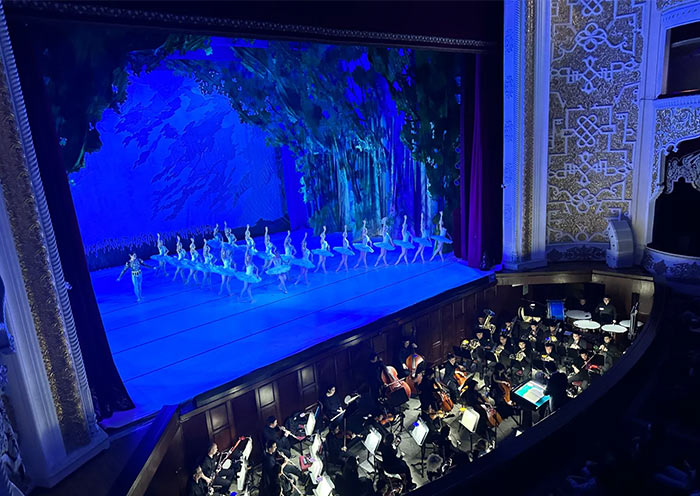
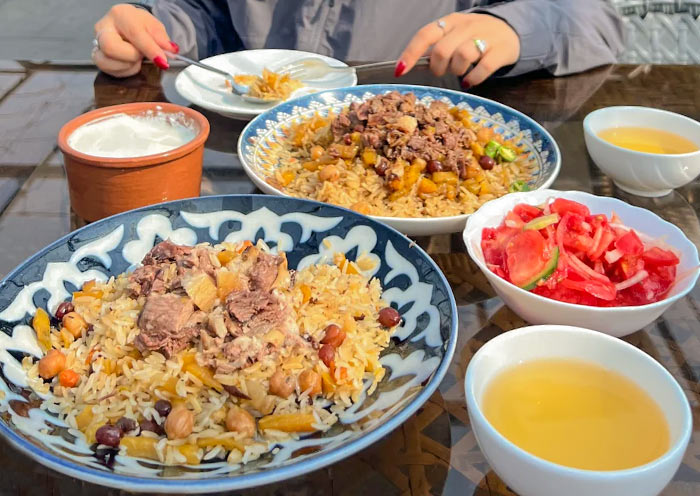
After breakfast, set out for full-day exploration of Tashkent, Uzbekistan’s vibrant capital and a city where centuries-old tradition meets modern charm.
Begin your day in the Old City at the Khast-Imam Complex, the spiritual heart of Tashkent. This serene ensemble of blue-domed mosques, mausoleums, and madrasahs invites you to step back in time. Here you’ll find the elegant Hazrati Imam Mosque, whose twin 53-meter minarets and gold-leafed domes dominate the square, as well as the Tillya Sheikh Mosque, Barak Khan Madrasah, and the Mausoleum of Abu Bakr Kaffal Shashi, a 10th-century scholar, poet, and locksmith-saint after whom the complex is named. Be sure to visit the Mui Muborak Library, home to the revered 7th-century Osman Qur’an - one of the world’s oldest copies.
After soaking up the complex’s peaceful atmosphere, stroll through Barak Khan Madrasah, now home to artisan workshops and boutiques. Watch local masters create ikat fabrics, woodcarvings, pottery, and jewelry, giving you a chance to bring home a unique handmade souvenir.
Continue your immersion in local culture with a visit to Chorsu Bazaar, Tashkent’s largest and most iconic marketplace. Beneath its turquoise dome, vendors sell colorful spices, dried fruits, fresh bread still warm from the tandoor, and vibrant handicrafts. Sample street food, chat with friendly locals, and experience the daily rhythm of Tashkent life.
Next, explore the State Museum of Applied Arts, where more than 7,000 exhibits showcase Uzbekistan’s finest craftsmanship from the 19th century to today. Admire intricate gold embroidery, suzani textiles, ceramics, jewelry, carpets, and woodcarvings, gaining a deeper appreciation for the country’s artistic traditions.
In the afternoon, descend underground for a ride on the Tashkent Metro - an experience in itself. As the first subway system in Central Asia, it is a living museum of Soviet architecture and Uzbek decorative art. Each station is uniquely designed, from Kosmonavtlar with its cosmonaut-themed mosaics to Paxtakor with cotton motifs.
Emerge at Amir Timur Square, the heart of modern Tashkent. Surrounded by landmarks such as Hotel Uzbekistan, the Palace of International Forums, and the University of Law, the square is anchored by a bronze equestrian statue of Amir Timur, the great Central Asian conqueror and founder of the Timurid Empire. Take time to relax by the fountains, stroll through the green spaces, and - if time allows - visit the Amir Timur Museum (closed Mondays), whose striking dome is depicted on the 1,000-som banknote. Inside, discover fascinating exhibits on Timur’s life and legacy.
After the tour, be escorted to the hotel in Tashkent.
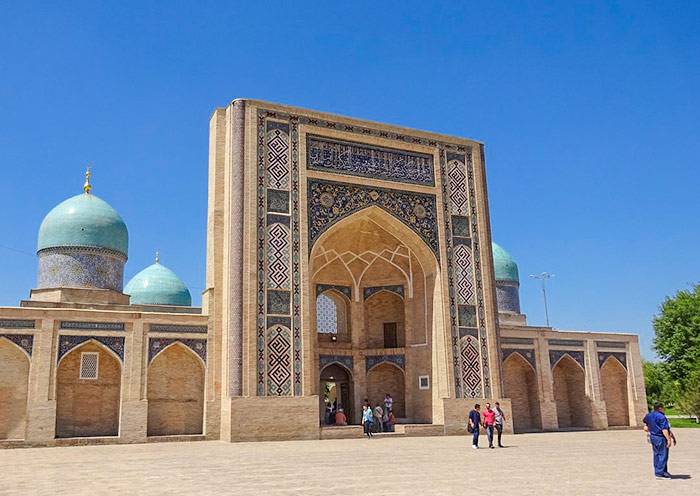
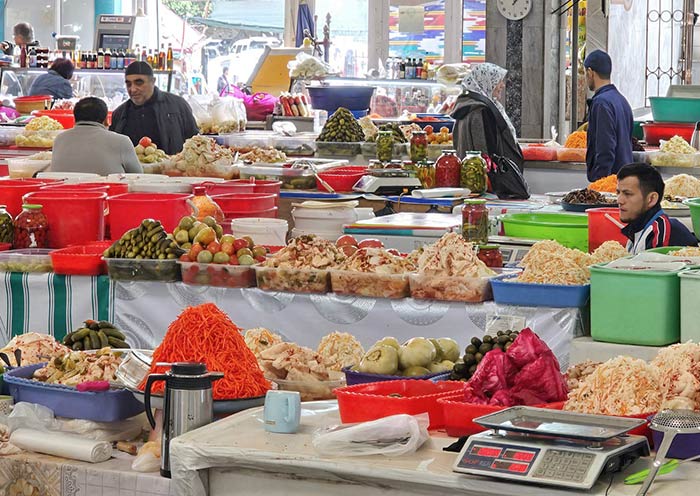
Begin your day with a morning flight to Urgench International Airport, followed by a short 36 km transfer to Khiva, a UNESCO World Heritage Site. The contrast is striking: leaving behind modern Tashkent, the Silk Road’s gateway, you step into a city that feels frozen in time. Once a thriving Silk Road hub in the 16th century, Khiva blended Persian, Turkic, and Russian influences, becoming a safe haven for traders and scholars.
“I would offer a bag of gold merely to catch a glimpse of Khiva.” This well-known Central Asian saying perfectly captures the city’s legendary allure. Khiva is a living “open-air museum,” a place where stepping through its gates feels like traveling back to the medieval era.
The highlight of Khiva is Itchan Kala, the perfectly preserved inner-walled city of the Khwarezm Empire (10th-17th centuries). Enclosed by 10-meter-high mud-brick walls, this UNESCO World Heritage site covers just 26 hectares and is home to about 2,000 residents. All its treasures - palaces, mosques, madrasahs, minarets, and mausoleums - lie within a walkable 1-kilometer radius, making it easy to explore on foot in half a day.
After breakfast, follow your guide through the Ata Darvaza (West Gate) to begin your journey through Khiva’s most iconic landmarks. Admire the turquoise-glazed Kalta Minor Minaret (the “Short Minaret”) and the nearby Muhammad Amin Khan Madrasah, the largest in Khiva. Continue to the peaceful Sayid Allauddin Mausoleum (14th century) and the Pakhlavan Makhmud Mausoleum, the holiest site in Khiva with its striking turquoise domes.
Climb (optional, self-pay) the Islam Khoja Minaret - at 57 meters tall, it offers breathtaking panoramic views over the city. Step into the Juma Mosque (Friday Mosque) with its mesmerizing forest of 218 wooden columns, and admire the intricate tilework at Allakuli Khan Madrasah. Explore the elegant Tosh Hovli Palace (Stone Palace) with its harem quarters and mirrored halls, and visit the Mohammed Rakhim Khan Madrasa for a glimpse of Khiva’s cultural history.
Also, explore Kuhna Ark (Old Fortress), a 17th-century citadel where you can see the khans’ harem, mint, stables, arsenal, mosque, and jail. If time permits, walk along the Itchan Kala walls (self-pay) for unforgettable panoramic views - a perfect spot to watch the sunset over Khiva’s timeless skyline. (Fun fact: Itchan Kala is featured on the 100,000 Uzbekistani som banknote!)
This evening, you will stay in Khiva.
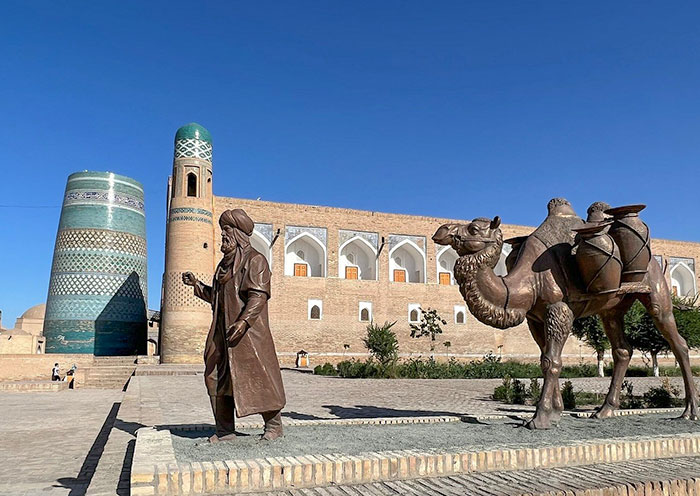
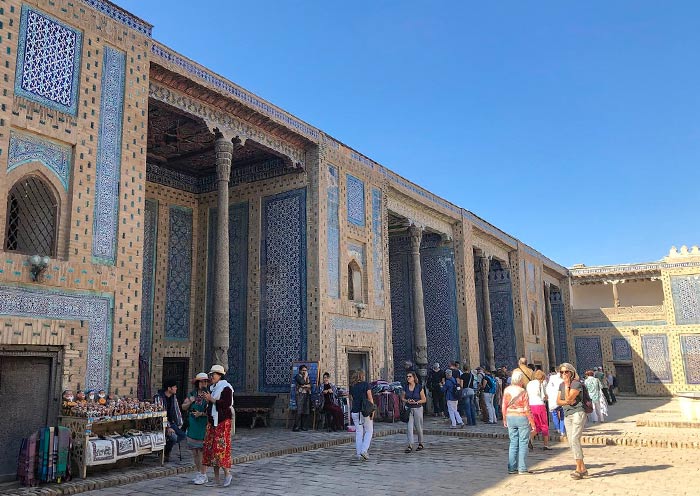
After breakfast, you’ll cross from Khiva into Turkmenistan at the Shavat Border Point. Our Turkmenistan guide and driver will be waiting to escort you for the remainder of the day’s sightseeing. You will continue to Kunya-Urgench.
Located in northwestern Turkmenistan, Kunya-Urgench was once one of Central Asia’s most prosperous cities and the capital of the powerful Khwarazmian Empire. It reached its peak in the 11th-12th centuries as both a major Silk Road trade hub and a leading center of science, culture, and art in the Islamic world. Many renowned scholars worked here, making it a city to rival Bukhara and Samarkand. Today, what you see are ancient ruins (dating from the 11th to 16th centuries) scattered across the desert landscape, but the site is in fact recognized as an important UNESCO World Heritage Site (since 2005). It is a place where you can trace the diverse methods and decorative styles of Islamic architecture in Central Asia.
On arrival, begin your visit at the Kutlug-Timur Minaret, soaring 60 meters high and the tallest structure on site. Continue to the Mausoleum of Sultan Tekesh (12th century), noted for its distinctive conical dome. Then explore the highlight of the complex, the Mausoleum of Turabeg Khanum (14th century), one of the most magnificent in the city. Take time to step inside and admire its breathtaking dome and intricate decorations. Also visit the Mausoleum of Il Arslan (12th century), where the square base and decorative brickwork reflect early Islamic architecture.
After the tour, drive south through the vast Karakum Desert to Darvaza Gas Crater (276 km, about 5 hours). You've now arrived at the "Door to Hell"!
The crater was formed in 1971 when Soviet geologists were drilling for natural gas. The ground beneath their rig collapsed, leaving a large hole with a diameter of 60 meters and a depth of 20 meters. To prevent the release of poisonous gas, they decided to light it on fire, hoping it would burn itself out in a few days. The gas, however, is still burning today.
At daylight, the crater may seem like an ordinary hole in the ground, with a slight haze of smoke. We'll take a walk around the site while our barbecue dinner is being prepared. As dusk falls, the simple hole transforms into a spectacular "fire temple," creating an otherworldly atmosphere that will ignite your imagination. We'll finish the day with a taste of delicious nomadic food, with the flickering lights of the "eternal" fire.
Stay overnight in a traditional yurt camp. (Note: The camp provides basic, shared outdoor washing and toilet facilities.)
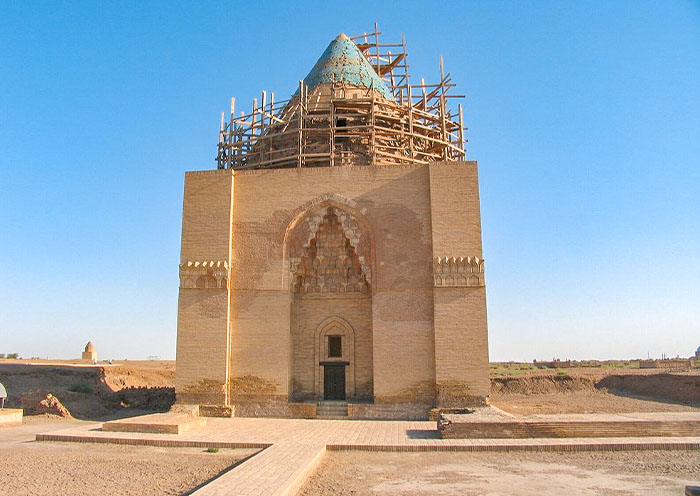
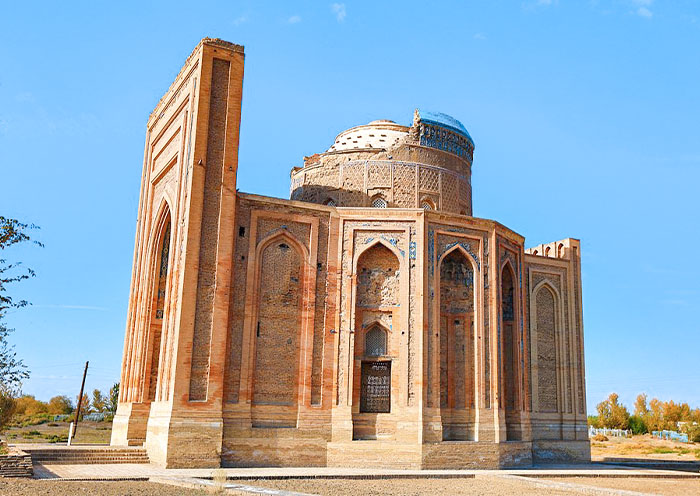
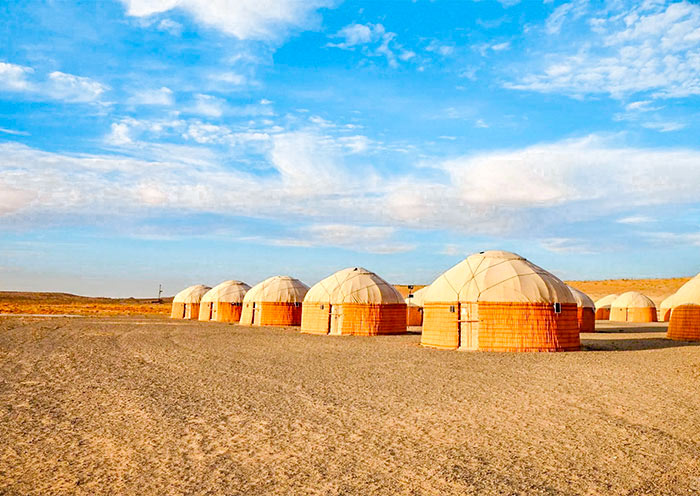
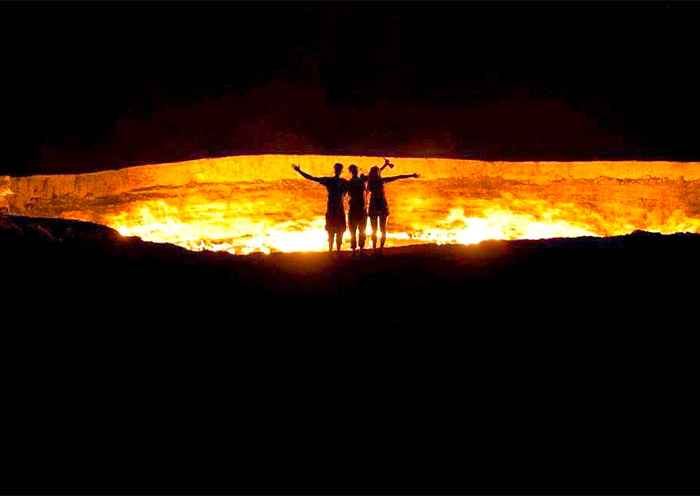
This morning, enjoy picnic-style breakfast at Darvaza in the desert. Afterward, drive back through the vast Karakum Desert and get back to Ashgabat (about 4-5 hours).
Ashgabat, the capital, is a pure white world, truly unique. It has been recognized by the Guinness World Records as the city with the highest density of white marble buildings. More than 500 structures are decorated with shining marble. Your driver will take you on a ride through these white giants, making you feel as if you’ve entered film-like world, similar to The Truman Show. Today, begin your adventure in Ashgabat.
In this afternoon, you will have more time to explore this white marble city. Head to the Ertugrul Gazi Mosque. Built in the 1990s as a gift from the Turkish government, this magnificent mosque was constructed entirely in the style of the Ottoman Empire, and its exterior is very similar to Istanbul's famous Blue Mosque. Upon arrival, you'll be struck by its four towering minarets and a magnificent central dome, all built from solemn white marble. Once inside, you'll be amazed by the opulent decoration, including delicate gilded carvings, intricate mosaic tiles, and huge crystal chandeliers, creating sacred and serene atmosphere.
Later, you'll have a chance to explore the Horse Stables to see the national pride of the Turkmen people, the Akhal-Teke horses, revered as some of the most beautiful horses in the world. Known as "heavenly horses," their most prominent feature is their metallic sheen.
You can also visit Gulistan Bazaar to experience vivid local life as you explore stalls filled with fresh fruits, vegetables, spices, and daily necessities or even Turkmen carpet. Feel free to try some local food here if you like.
Stay overnight in Ashgabat.
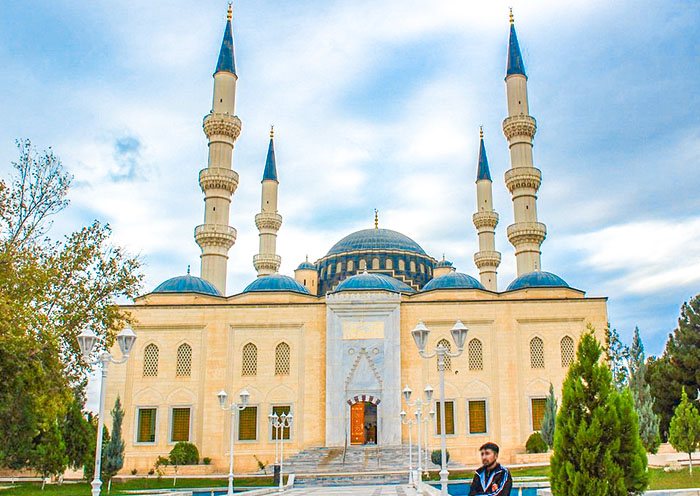
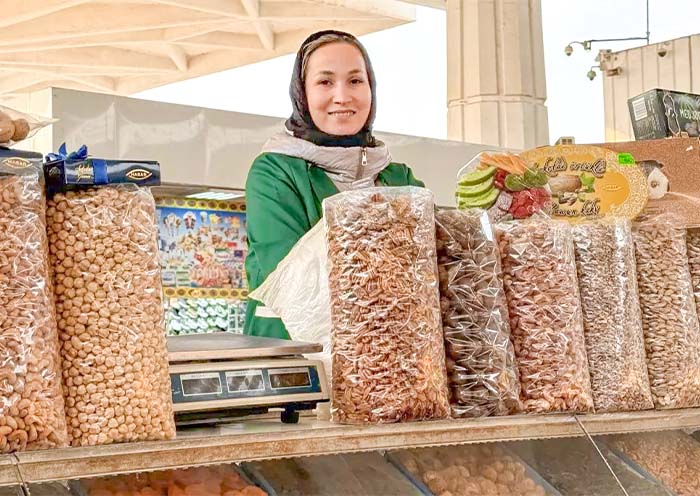
After breakfast, set out to explore the architectural marvels and cultural highlights of Ashgabat, famously known as the “White City” for its gleaming marble-clad buildings.
Begin at the Neutrality Monument, a striking 75-meter-high, tripod-shaped arch built in 1998 to symbolize Turkmenistan’s permanent neutrality and its commitment to peace and goodwill. From its viewing platform, enjoy sweeping panoramas of the capital.
Continue to the National Museum of Turkmenistan, one of Central Asia’s finest museums. Its white-marble exterior, crowned by a brilliant blue dome and golden statues, is as impressive as the treasures inside. With over 500,000 artifacts on display, you’ll discover archaeological finds from legendary Silk Road sites like Nisa, Merv, and Gonur Depe. Admire coins, weapons, pottery, and exquisite gold jewelry, along with traditional clothing that tells the story of Turkmen heritage. Don’t miss the museum’s star exhibits - the ancient rhytons, ceremonial drinking vessels of extraordinary beauty.
Next, stroll through Independence Park, home to statues of poets, philosophers, and national heroes, and marvel at the soaring Independence Monument, a 118-meter masterpiece built to commemorate Turkmenistan’s independence in 1991.
In the afternoon, see more of Ashgabat’s futuristic skyline. Make a brief stop to admire the Alem Cultural and Entertainment Center - featuring the world’s largest indoor Ferris wheel - and the distinctive Palace of Happiness, whose design resembles an eight-pointed star embracing a globe.
Later, visit the Turkmen Carpet Museum, where you can admire the world’s largest handwoven carpet (301 m², recognized by the Guinness World Records), discover the intricate weaving techniques passed down for generations, and learn about the symbolism behind traditional patterns.
Conclude your day at the impressive Kipchak Mosque (also called the Turkmenbashi Ruhy Mosque), a breathtaking blend of traditional Islamic architecture and modern design. Its white marble façade, golden dome, and four towering minarets create a majestic silhouette. Inside, admire glittering chandeliers, intricate geometric patterns, and inscriptions from both the Quran and the Ruhnama (Book of the Soul) written by Turkmenistan’s first president.
After this full-day exploration, return to your hotel in Ashgabat.
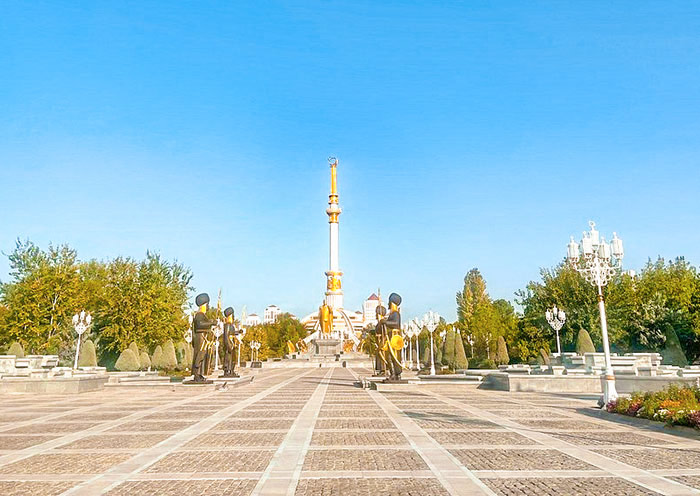
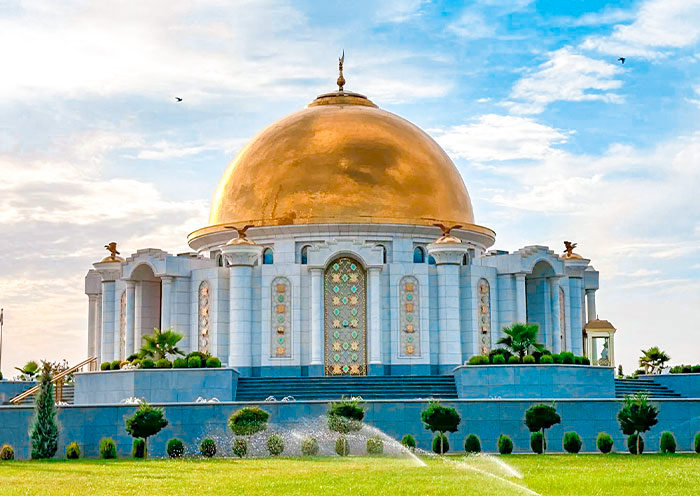
After breakfast, you will be escorted to the Ashgabat airport for your flight to Mary (312km, 40 minutes).
Upon arrival at Mary International Airport, our driver will pick you up and transfer you to Ancient Merv, located 33km northeast of Mary. This UNESCO World Heritage site is the oldest and best-preserved of the oasis-cities along the Silk Route in Central Asia. It has spanned over 4,000 years’ history. During the medieval period, its population exceeded one million, making it one of the largest cities in the world. It was known as the "Queen of the World" and the "Jewel of the Silk Road."
Within the vast 1,200-hectare archaeological park, you'll have the chance to observe all the constituent parts of this "wandering city." The site consists of a series of adjacent cities, roughly divided into the ancient (Erk Kala and Gyaur Kala), the medieval (Sultan Kala), and the post-medieval (Abdulla-Khan Kala and Bayram-Ali-Khan Kala). Besides these remnants, you'll also visit the 6th-9th century AD forts of Big and Little Kyz-Kalas, which are excellent examples of the so-called "corrugated Koshks." You'll also explore the splendid 12th-century mausoleums of Sultan Sanjar and Muhammed ibn-Zeyd, which demonstrate exquisite Seljuk-period brickwork and architectural décor.
This afternoon, depart Merv for the Farap border crossing on the Turkmenistan–Uzbekistan frontier, located northeast of Merv (about 239 km, 5-6 hours’ drive).
After completing customs and passport control on both sides of the border, proceed to the exit of the border control area, where your Uzbekistan guide/driver will be waiting to greet you with a sign bearing your name.
From here, continue your journey to Bukhara (about 123 km, 2 hours). Upon arrival in Bukhara, check in to your hotel and enjoy good rest before tomorrow’s exploration of this legendary Silk Road city.
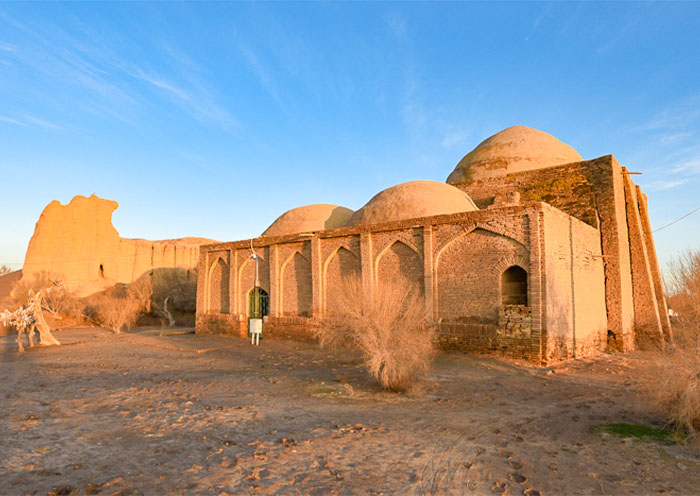
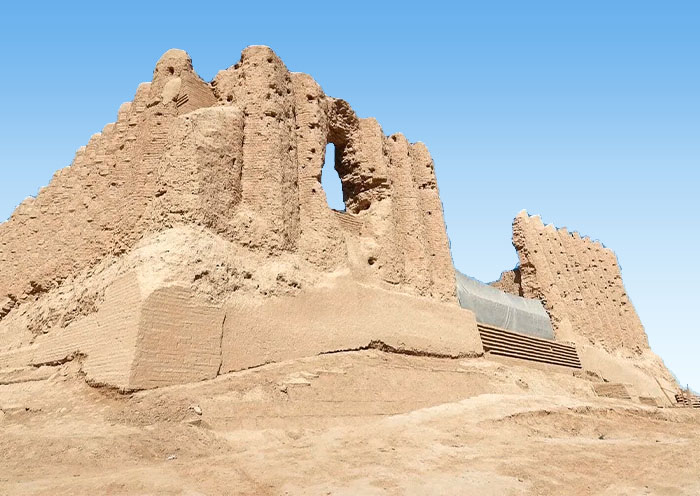
Today, follow our guide to fully explore Bukhara, a UNESCO World Heritage Site and one of the most atmospheric cities along the Silk Road. Often called the “Second Mecca,” Bukhara has been a center of Islamic learning for centuries and is famous for its 2,500-year-old history as a Silk Road hub, from the era of the Samanids to the Timurids. This legendary city is also tied to the tales of One Thousand and One Nights and is the home of the beloved folk character Afandi.
Bukhara is wonderfully walkable - most of its landmarks are within a compact 6 km stretch - making it easy to immerse yourself in its living history, lively bazaars, and warm local atmosphere.
Your exploration begins at Chor Minor Madrasah, the four-towered gem that once graced the cover of Lonely Planet Central Asia. Built in 1807 by the wealthy merchant Khalif Niyazkul, its four unique minarets are believed to represent the four major religions of the world, with decorations that some interpret as Buddhist prayer wheels, Christian crosses, Zoroastrian motifs, and Islamic patterns. This charming structure is all that remains of a once-grand madrasa complex.
Continue to Lyabi Hauz Ensemble, the beating heart of Bukhara since the 17th century. Built around a peaceful pool shaded by mulberry trees, this square was once a lively Silk Road trading hub. Its three surrounding monuments — the Nadir Divan-Beghi Madrasah, the Nadir Divan-Beghi Khanaka (Sufi hospice), and the Kukeldash Madrasah - are masterpieces of Central Asian architecture. Today, Lyabi Hauz remains the social center of the city, lined with cafes where locals sip tea and travelers watch the world go by. Don’t miss the playful statue of Khodja Nasreddin (Afandi), the wise fool of Sufi legend, riding his donkey.
Nearby is the Magoki Attori Mosque, Bukhara’s oldest surviving mosque, dating back to the 9th–10th centuries. Situated 4.5 meters below ground level, this mosque is a true archaeological wonder, displaying ancient brickwork and terracotta ornamentation. It now houses a small carpet museum (admission self-pay).
From there, stroll through Bukhara’s famous Trading Domes, a network of 16th-century domed bazaars - Toki-Zargaron, Toki-Sarrofon, Telpak-Furushon, and Tim Abdullah Khan. Once bustling hubs for jewelers, money changers, and silk merchants, they still sell traditional crafts, carpets, and souvenirs, allowing you to experience Bukhara’s mercantile spirit firsthand.
Next, reach the Po-i-Kalyan Complex, the iconic centerpiece of Bukhara’s skyline. Here you will admire the 47-meter-high Kalyan Minaret - so magnificent that Genghis Khan spared it from destruction. The adjacent Kalyan Mosque, with its 288 domes and capacity for 10,000 worshippers, and the Mir-i-Arab Madrasah, with its turquoise domes and active Islamic school, together form one of Central Asia’s most stunning architectural ensembles.
Your final stops are the Ark of Bukhara, the ancient fortress that served as the royal residence for centuries, and the nearby Bolo Hauz Mosque, known as the “Mosque of Forty Columns” for its 20 exquisitely carved wooden pillars reflected in the pool in front. Inside the Ark, explore its throne room, coronation mosque, and museums, or climb to the top for sweeping views over the city.
Optional sunset tip: For an unforgettable end to your day, watch the sunset from the Ark’s walls or a rooftop near Po-i-Kalyan. As the minarets glow golden and the call to prayer echoes across the old city, Bukhara feels truly timeless.
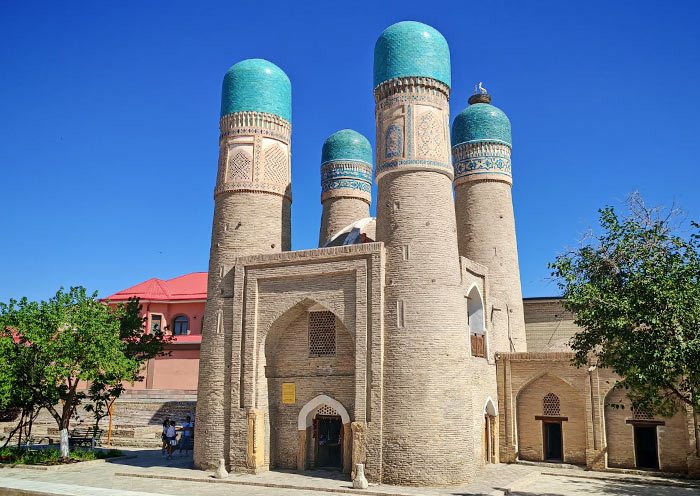
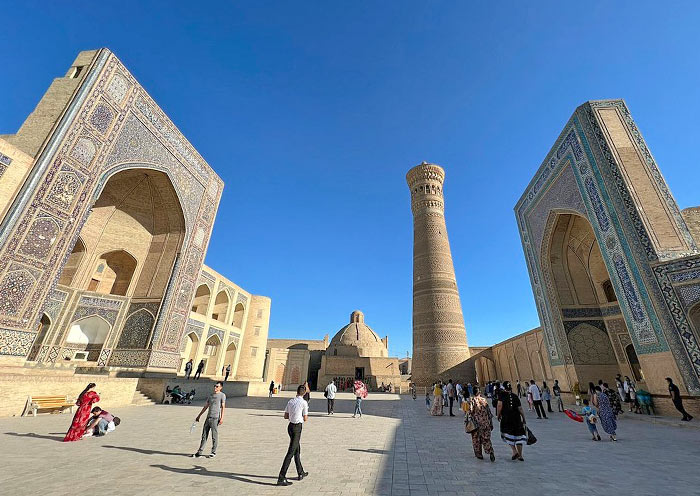
This morning, continue your journey through Bukhara, the Religious and Academic Capital of the Silk Road, as you explore its palaces and mausoleums. Later this afternoon, board a comfortable train to Samarkand, the legendary Silk Road crossroads founded over 2,700 years ago.
Begin with a visit to the Sitorai Mokhi Khosa Palace, the summer residence of Bukhara’s last emirs, located just 4 km outside the city. Its name poetically means “Palace of the Stars and the Moon.” The current palace, built between 1912 and 1918, perfectly blends Russian and Bukhara styles, offering a fascinating glimpse into royal life on the eve of the 20th century. Stroll through its lavishly decorated rooms, including the famous White Hall with its ganch carving set against mirrored walls, and admire the displays of Chinese porcelain, palace furniture, and embroidered national dress. Outside, enjoy the palace’s 7-hectare gardens where peacocks still wander freely, as they did a century ago.
Continue to the Ismail Samani Mausoleum, one of Central Asia’s most important architectural treasures and the only surviving monument of the Samanid dynasty (9th–10th c.). This cube-like brick mausoleum is a masterpiece of early Islamic architecture, combining durability with artistic elegance. Its intricate brick patterns and Zoroastrian-influenced forms create a quiet, meditative atmosphere within Samani Park - a serene spot to reflect on Bukhara’s ancient history.
Next, visit the Chashma-Ayub Mausoleum, also known as the “Spring of Holy Job.” Built by the Karakhanids in the 12th century, this unique structure is crowned with a tent-like roof. According to legend, the prophet Job struck the ground with his staff here, causing a spring to appear whose waters healed him. Today, visitors can see the holy spring, taste its water, and explore the small Museum of Water, which chronicles Bukhara’s historic irrigation systems.
In the afternoon, transfer to the Bukhara Railway Station for your train to Samarkand (about 2.5 hours). Upon arrival, transfer to your hotel and check in for an overnight stay.
Evening Tip:
If time allows, head to Registan Square after dark. The golden-lit madrasahs and enchanting light shows create a magical, almost surreal atmosphere - perfect for soaking in the spirit of Samarkand and capturing stunning photos.
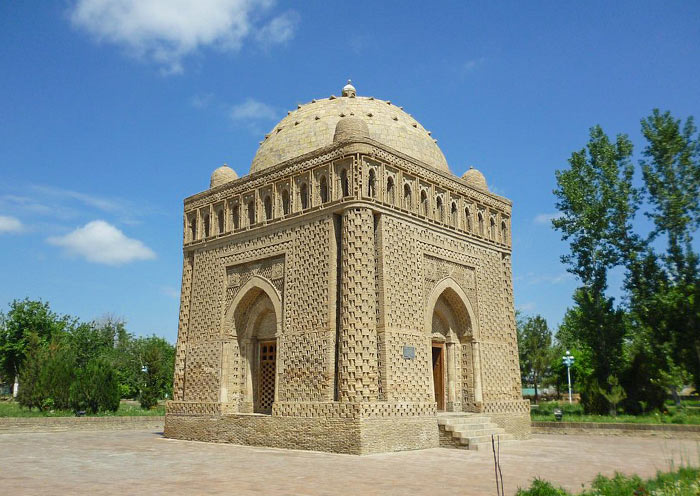
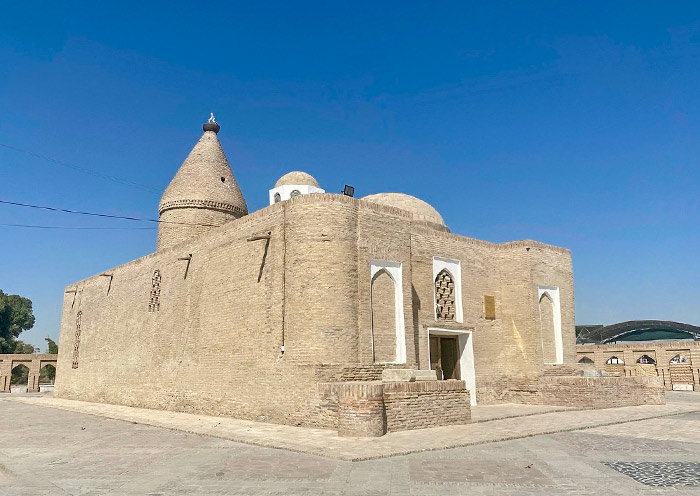
Today, immerse yourself in Samarkand, a UNESCO World Heritage Site and the former capital of the Timurid Empire (14th–15th centuries). Known as Uzbekistan’s cultural heart and second-largest city, Samarkand dazzles visitors with its monumental architecture, Silk Road legends, and vibrant bazaars. From the majestic Gur-e Amir Mausoleum to the iconic Registan Square, the grand Bibi Khanim Mosque, the breathtaking Shahi Zinda Necropolis, and the lively Siyab Bazaar, you will discover a city that celebrates the glory and power of the Timurid dynasty.
Begin at Gur-e Amir Mausoleum, the final resting place of Amir Timur (Tamerlane), completed in 1404. This striking monument, crowned with a ribbed azure dome, served as a prototype for later Mughal architecture, including India’s Taj Mahal. Step inside to marvel at its gilded interior, intricate jade tombstones, and delicate calligraphy. Look for Timur’s legendary grave marker, said to carry a warning: “Whosoever disturbs my tomb will unleash an invader more terrible than I.” When Soviet archaeologists opened the tomb in June 1941, Nazi Germany invaded the USSR days later - a story that adds an air of mystery to your visit.
Next, head to Registan Square, the heart of Samarkand and one of the Silk Road’s most magnificent sights. Once a sandy gathering place for royal decrees, military parades, and festivals, it is now flanked by three resplendent madrasahs: Ulugh Beg Madrasa (1420), with its starry celestial mosaics; Sher-Dor Madrasa (1619), famed for its unique lion mosaics; and Tilya-Kori Madrasa (1660), with a dazzling gold-leaf dome that graces the cover of many guidebooks. By day, Registan is a masterpiece of symmetry and tilework; by night, it transforms under magical illuminations - a perfect spot for photography.
Continue to the monumental Bibi Khanim Mosque, one of the largest in the Islamic world. Built in 1404 to honor Timur’s wife, the mosque is steeped in legend - including the tale of the architect who dared to kiss Bibi Khanim and met Timur’s wrath. Step inside to admire gilded decorations inspired by local embroidery traditions.
Right nearby lies Siyab Bazaar, where you can sample Samarkand’s famous round bread, dried fruits, and spices while mingling with locals - a lively reminder that Samarkand was once a key Silk Road trading hub.
End your day with a stroll through Shahi Zinda Necropolis, an extraordinary “avenue of mausoleums” climbing a hillside. This necropolis, dating from the 11th to 15th centuries, contains some of the finest examples of Timurid-era tilework and the tombs of Timur’s female relatives and high-ranking nobles. The site is also believed to house the grave of Qutham ibn Abbas, cousin of Prophet Muhammad, making it a revered pilgrimage site. With its brilliant turquoise domes and intricate mosaics, Shahi Zinda is not just a spiritual landmark but also one of Samarkand’s most photogenic spots.
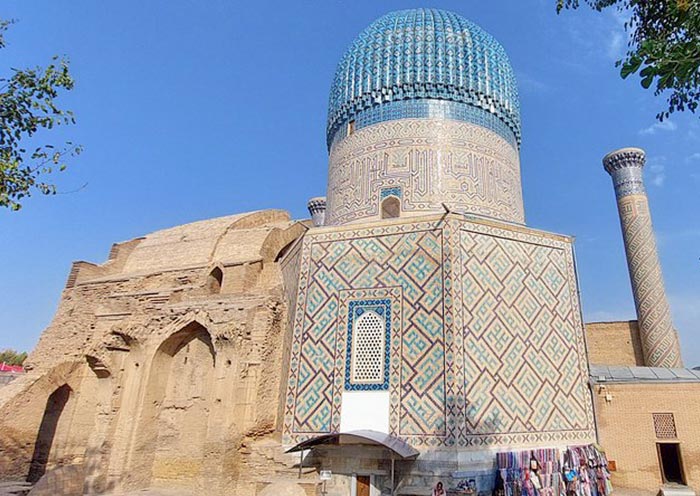
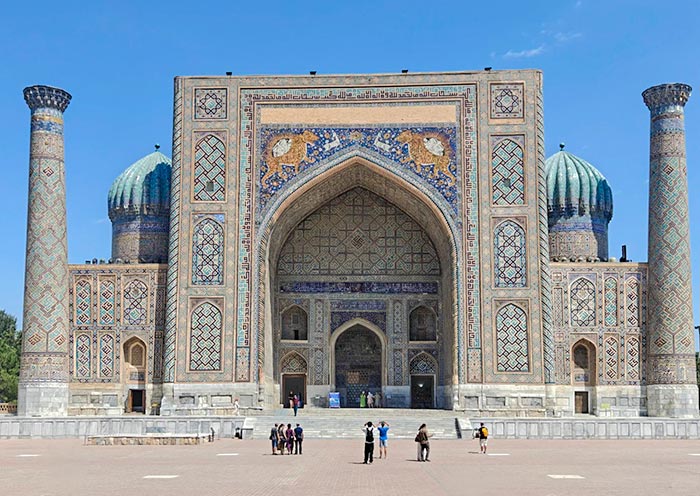
Spend your final morning in Samarkand, deepening your appreciation for this Silk Road gem. Begin at the Ulugh Beg Observatory, one of the most advanced observatories of the medieval world. Built in the 1420s by Ulugh Beg, Timur’s scholarly grandson and an “Astronomer King,” this hilltop site once housed a massive 11-meter sextant used to chart the heavens with remarkable accuracy. Though the observatory was destroyed in 1449 and only rediscovered in 1908, its surviving ruins and small museum offer fascinating insight into Samarkand’s golden age of science - and reward visitors with sweeping city views.
Continue to the Khodja Doniyor Mausoleum (Tomb of Sait Daniel), a spiritual site revered by Muslims, Jews, and Christians alike. Here lies the legendary tomb of Prophet Daniel, its sarcophagus unusually long at 18 meters — said to grow a little each year. Timur brought Daniel’s relics to Samarkand, and pilgrims have been coming ever since to pray at the tomb and drink from its sacred spring, believed to have healing properties. The serene setting on the banks of the Siab River makes this a perfect stop for quiet reflection and to appreciate Samarkand’s role as a crossroads of faith and culture.
Before departing, visit the Afrosiab Museum, located on the ruins of ancient Samarkand. This museum reveals the city’s 2,500-year history, from its earliest settlement through its Silk Road zenith. The highlight is the 7th-century Hall of Ambassadors fresco, which vividly portrays King Varkhuman welcoming envoys from China, Persia, and beyond - a remarkable record of early diplomacy. Pottery, coins, and ossuaries showcase life in pre-Mongol Samarkand, and a detailed city model helps you imagine the metropolis before Genghis Khan’s conquest.
In the afternoon, transfer to the railway station for your train journey back to Tashkent. On arrival in Uzbekistan’s bustling capital - a lively mix of Soviet architecture, leafy parks, and modern cafés - settle in for the night.
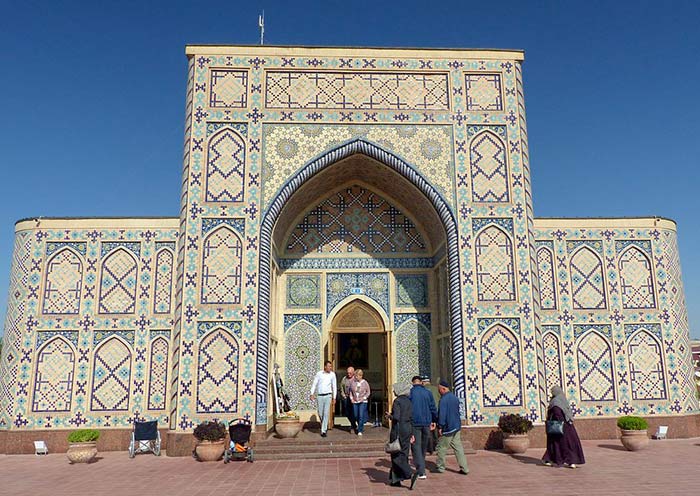
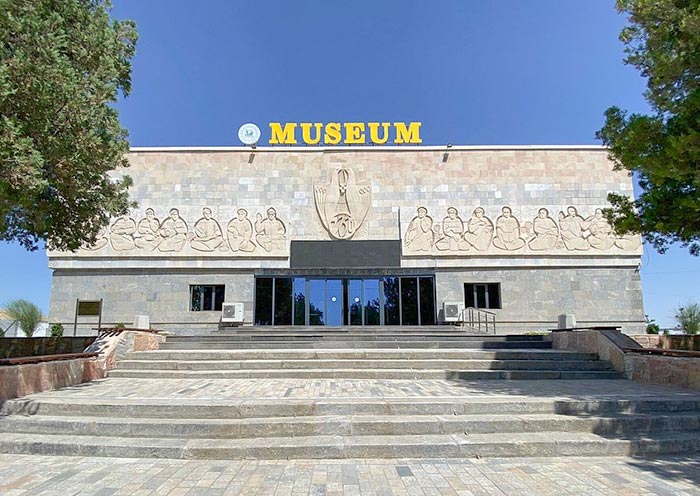
After breakfast, you will have some free time to explore Tashkent. Afterward, you will be transferred to the airport for your flight to your next destination or to return home. Your 12-day Uzbekistan Turkmenistan tour concludes here. (Tip: Please inform us of your flight details so we can arrange your airport transfer accordingly.)
Optional Extension:
Uzbekistan and Turkmenistan are parts of a larger Central Asia tour. You can also cover other highlights in Kazakhstan, Kyrgyzstan, and Tajikistan. We can tailor Central Asia tour based on your preferred duration and interests.
Thank you for choosing Asia Odyssey Travel for your Uzbekistan Turkmenistan tour. We look forward to welcoming you back for your next adventure!
Price: What’s Included & What’s Excluded
What's Included:
What's Excluded:
Central Asia Trip Notes & Booking Tips
| Country | Highlights | Must-Do Experiences |
|---|---|---|
| Kazakhstan | Endless steppe, futuristic cities, striking natural wonders | Explore Almaty’s lively streets, marvel at Charyn Canyon, ride cable cars to mountain viewpoints, and learn about nomadic horse culture |
| Kyrgyzstan | Mountain peaks, alpine lakes, nomadic spirit | Stay in a yurt at Issyk-Kul Lake, visit Burana Tower, hike alpine gorges, and watch eagle hunting demonstrations |
| Uzbekistan | Silk Road jewels, turquoise domes, vibrant bazaars | Wander Registan Square in Samarkand, explore Bukhara’s old town, admire mosaics in Shakhrisabz, shop for silk, spices, and carpets |
| Tajikistan | Rugged mountains, hidden valleys, Sogdian history | Discover Penjikent’s ruins, trek to the Seven Lakes, and meet locals in remote mountain villages |
| Turkmenistan | Marble cities, desert mysteries, Silk Road ruins | Camp by the fiery Darvaza Gas Crater, explore Ancient Merv, and see Ashgabat’s white-marble monuments |
- Spring (April June): Mild weather, blooming valleys, fewer crowds
(1) Perfect for sightseeing in Uzbekistan’s Silk Road cities (Samarkand, Bukhara, Khiva) before the summer heat. (2) Kyrgyzstan’s and Kazakhstan’s mountains are lush and green, great for gentle hikes. (3) Desert areas in Turkmenistan are comfortable for visiting Darvaza Gas Crater and Merv.
- Autumn (September October) - Most Recommended Season: Pleasant temperatures, colorful landscapes
(1) Ideal time for a grand tour of all 5 Stans. (2) Crisp, sunny days make exploring cities and mountain regions easy. (3) Harvest season - fresh fruits, bazaars full of melons, grapes, pomegranates. (4) Issyk-Kul Lake and alpine gorges in Kyrgyzstan are at their most photogenic.
- Summer (July August): Hot in deserts & Silk Road cities (up to 40°C), but: great for high-altitude trekking in Kyrgyzstan and Tajikistan (Pamir Mountains, Seven Lakes).
For most western / developed-country travelers, Kazakhstan, Kyrgyzstan, Uzbekistan, and Tajikistan are fairly easy to enter (visa-free or e-visa) if you plan properly.
Turkmenistan remains the most challenging: must plan ahead, may need a LOI, possibly limit to tour operator itineraries.
Always check entry point regulations (airport vs land border), as some visas / e-visas / visa-on-arrival are only valid through certain border crossings.
Double-check the duration you're allowed (30, 45, 60, 90 days) - depends heavily on your passport country.
| Theme | Highlights | Where |
|---|---|---|
| Silk Road Cultures | Wander historic Silk Road cities with turquoise domes and caravanserais | Uzbekistan: Samarkand, Bukhara, Khiva |
| Explore an ancient Sogdian city and its 7thcentury frescoes | Tajikistan: Penjikent | |
| Contrast Ashgabat’s modern whitemarble skyline with the ruins of ancient Merv | Turkmenistan: Ashgabat, Merv | |
| Meet artisans weaving carpets, baking traditional bread, crafting felt yurts - living nomadic traditions | Across Central Asia (community workshops, markets, yurt makers) | |
| Nature Landscapes | Marvel at the Darvaza Gas Crater glowing in the Karakum Desert | Turkmenistan: Darvaza, Karakum Desert |
| Relax by IssykKul, the “Pearl of Kyrgyzstan,” ringed by snowcapped peaks | Kyrgyzstan: IssykKul Lake | |
| Hike to Tajikistan’s Seven Lakes or explore the “little brother” to the Grand Canyon | Tajikistan: Seven Lakes; Kazakhstan: Charyn Canyon | |
| Experience nomadic life in a yurt camp, ride horses in alpine valleys, stargaze on the steppe | Kyrgyzstan, Kazakhstan (yurt camps, alpine pastures) |
- Darvaza Gas Crater camping with desert stargazing
- In-depth Silk Road exploration of Samarkand’s old city
- Tajikistan’s Seven Lakes hike with a lakeside picnic
- Kyrgyz falconry show and hands-on yurt-making experience
- Charyn Canyon hike plus Almaty cable car to a skyline night view
- Tajik home visit with demonstrations of traditional handicrafts
Our tour is designed to provide a comprehensive experience without feeling overly rushed. We balance city tours with travel days to ensure you get enough rest. While some days involve long drives between destinations, we plan strategic stops for sightseeing and breaks. You'll have time to explore the major sites in each city and enjoy the journey between them. The pace varies by region: cities like Samarkand are fast-paced, while the mountain regions of Tajikistan and Kyrgyzstan offer a slower, more relaxed tempo.
Here’s what to expect at the most commonly used checkpoints:
| Border Crossing | Connects | Opening Hours | Crossing Time | Crossing Type | Notes for Travelers |
|---|---|---|---|---|---|
| Oybek | Tashkent (Uzbekistan) ⇆ Khujand (Tajikistan) | Daily, usually 08:00–18:00 | ~30–60 min (may be longer on weekends/holidays) | Pedestrian & vehicle | One of the busiest crossings; be ready for lines. Good road conditions on both sides. |
| Jartepa | Samarkand (Uzbekistan) ⇆ Penjikent (Tajikistan) | Daily, 08:00–18:00 | ~20–40 min | Pedestrian & vehicle | Most convenient for travelers; short transfer, border staff generally friendly. |
| Shavat | Khiva/Urgench (Uzbekistan) ⇆ Dashoguz (Turkmenistan) | Daily, 09:00–18:00 | ~45–90 min | Pedestrian only (vehicles drop/pick up travelers at both sides) | Requires Turkmen visa in advance or pre-arranged LOI. Can be busy in mornings. |
| Farap | Bukhara (Uzbekistan) ⇆ Turkmenabat (Turkmenistan/Mary route) | Daily, 08:00–18:00 | ~1–2 hrs | Pedestrian & vehicle | Key crossing for travelers heading to Merv; customs can take longer, be patient. |
| Korday | Bishkek (Kyrgyzstan) ⇆ Almaty (Kazakhstan) | Open 24 hrs | ~30–60 min (rush hours longer) | Pedestrian & vehicle | Major highway crossing, usually efficient; popular with locals and travelers. |
Traveler Tips:
- Timing Matters: Arrive early in the morning to avoid queues, especially at Shavat & Farap.
- Paperwork Ready: Keep passports, visas (or e-visa printouts), and customs forms handy.
- Walking vs. Vehicle:At some borders (Shavat, Oybek), you may need to walk across the neutral zone (few hundred meters).
- Seasonal Considerations: Summer is busier due to local travel; winter may bring delays from weather.
- Patience & Flexibility: Border procedures are generally friendly but not always fast - use this time to experience the real pace of Central Asia.
Hotels & Camping Experiences in Central Asia
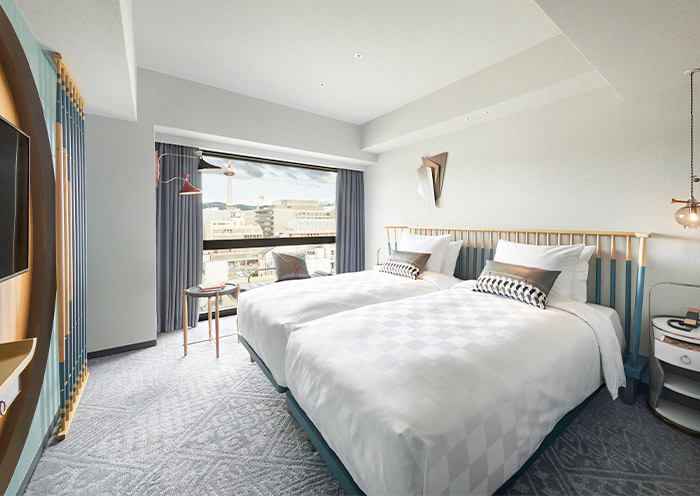

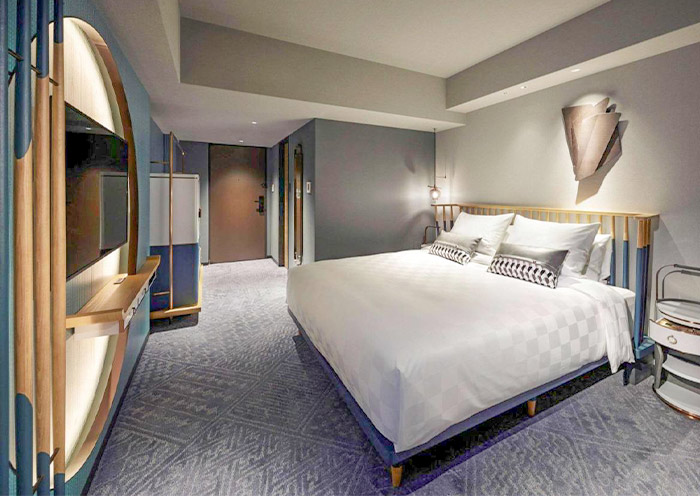
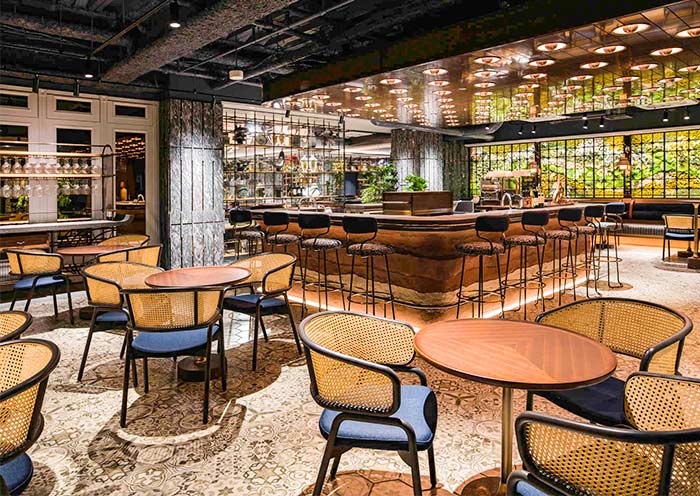
We carefully select accommodations across the five “Stans” to ensure both comfort and authenticity.
In Cities:
You will stay in well-located hotels (3-5 stars, with 4 stars recommended) - a mix of international chains and charming boutique hotels. All are clean, comfortable, non-smoking, and offer easy access to lively bazaars, shopping streets, and major attractions. Free Wi-Fi is available in most properties.
In Villages & Countryside:
Around the Seven Lakes, Pamir, and Issyk-Kul areas, accommodation is mainly in cozy family guesthouses, mountain lodges, or traditional yurt camps. Facilities are simple but authentic, letting you experience the local way of life. Yurt camps in Kyrgyzstan and Kazakhstan are usually shared or semi-private, with communal or partially private bathrooms. Nights can be chilly, but electric blankets or stoves are typically provided.
Camping Experience:
At places like the Darvaza Gas Crater, you will stay in fixed or mobile tents with basic shared facilities. Nights can be windy with significant temperature drops, so warm clothing is recommended.
Photo Gallery for This Itinerary
Latest Central Asia Tours Reviews from Our Customers

David
United States
Date of Experience: Oct 15, 2025
Tour Customized by: Amy
You May be Interested in This Tour: 26 Days Central Asia Tour: In-Depth Journey through the Five Stans

Sofia Rodriguez
Spain
Date of Experience: Sep 25, 2025
Tour Customized by: Anthony
You May be Interested in This Tour: 5 Days Classic Turkmenistan Tour: UNESCO Ancient Wonders & Door to Hell

Marco-Bianchi
Italy
Date of Experience: Sep 03, 2025
Tour Customized by: Alina
You May be Interested in This Tour: 8 Days Uzbekistan Silk Road Tour - Tashkent, Khiva, Bukhara & Samarkand
Price: Request
(Based on a private tour for two people. Price varies depending on program, travel date, number of people.)
Free Enquiry! You don’t need to pay for the reservation.
- United States (+1)
- Australia (+61)
- Singapore (+65)
- Malaysia (+60)
- Philippines (+63)
- Canada (+1)
- Italy (+39)
- Indonesia (+62)
- United Kingdom (+44)
- Spain (+34)
- Mexico (+52)
- Hong Kong (+852)
- Thailand (+66)
- United Arab Emirates (+971)
- New Zealand (+64)
- South Africa (+27)
- Germany (+49)
- Brazil (+55)
- India (+91)
- France (+33)
- Vietnam (+84)
- The Netherlands (+31)
- Saudi Arabia (+966)
- Ireland (+353)
- Argentina (+54)
- Switzerland (+41)
- Romania (+40)
- Pakistan (+92)
- Japan (+81)
- Portugal (+351)
- Bangladesh (+880)
- South Korea (+82)
- Puerto Rico (+1)
- Türkiye (+90)
- China (+86)
- Belgium (+32)
- Qatar (+974)
- Greece (+30)
- Taiwan (+886)
- Austria (+43)
- Poland (+48)
- Israel (+972)
- Chile (+56)
- Sri Lanka (+94)
- Nigeria (+234)
- Peru (+51)
- Colombia (+57)
- Hungary (+36)
- Nepal (+977)
- Denmark (+45)
- Bulgaria (+359)
- Norway (+47)
- Slovenia (+383)
- Sweden (+46)
- Kuwait (+965)
- Costa Rica (+506)
- Ecuador (+593)
- Venezuela (+58)
- Malta (+356)
- Croatia (+385)
- Tunisia (+216)
- Czechia (+420)
- Mongolia (+976)
- Bahrain (+973)
- Mauritius (+230)
- Papua New Guinea (+675)
- Cambodia (+855)
- Dominican Republic (+1)
- Luxembourg (+352)
- Finland (+358)
- Guatemala (+502)
- Myanmar (+95)
- Maldives (+960)
- Slovakia (+421)
- Laos (+856)
- Serbia (+381)
- Brunei (+673)
- Oman (+968)
- Macao (+853)
- Panama (+507)
- Morocco (+212)
- Jordan (+962)
- Georgia (+995)
- Fiji (+679)
- Bolivia (+591)
- Lithuania (+370)
- Bahamas (+1)
- Cyprus (+357)
- Latvia (+371)
- Bhutan (+975)
- Iraq (+964)
- Iran (+98)
- Kenya (+254)
- Jamaica (+1)
- Zimbabwe (+263)
- Azerbaijan (+994)
- Uruguay (+598)
- Estonia (+372)
- Andorra (+376)
- Cameroon (+237)
- Ghana (+233)
- Kazakhstan (+7)
- Nicaragua (+505)
- Egypt (+20)
- Russia (+7)
- Albania (+355)
- Réunion (+262)
- Montenegro (+382)
- Algeria (+213)
- Afghanistan (+93)
- Martinique (+596)
- Uganda (+256)
- Honduras (+504)
- North Macedonia (+389)
- Trinidad and Tobago (+1)
- Suriname (+597)
- Antigua and Barbuda (+1)
- Zambia (+260)
- Ukraine (+380)
- Armenia (+374)
- Barbados (+1)
- Belarus (+375)
- Palestine (+970)
- Lesotho (+266)
- Moldova (+373)
- Ethiopia (+251)
- French Polynesia (+689)
- Gambia (+220)
- Guam (+1)
- Gibraltar (+350)
- Isle of Man (+44)
- New Caledonia (+687)
- El Salvador (+503)
- Comoros (+269)
- Seychelles (+248)
- Chad (+235)
- Samoa (+685)
- Cook Islands (+682)
- Palau (+680)
- Paraguay (+595)
- DR Congo (+243)
- Solomon Islands (+677)
